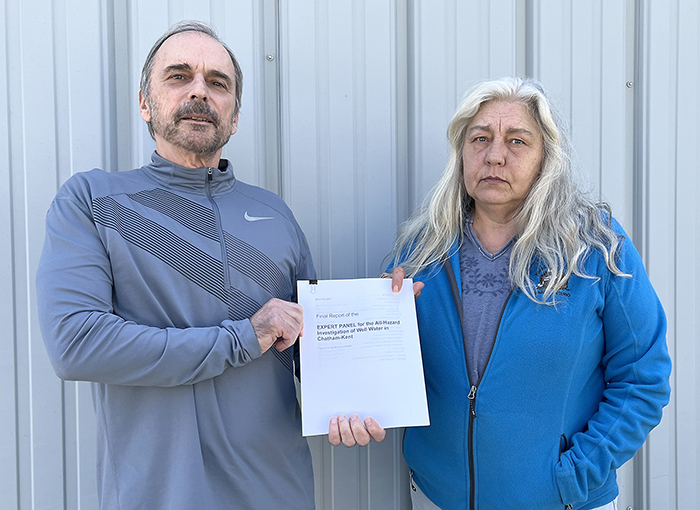
By Pam Wright
Local Journalism Initiative Reporter
Concerns that water wells in Chatham-Kent may be toxic to human health continue for residents in Dover and North Kent.
That’s according to Christine Burke of the Wallaceburg Area Wind Concerns group and geologist Keith Benn who recently obtained test results from nine area wells.
The analyses were performed by an independent laboratory in Livonia, Mich, known for its role in the Flint Michigan water crisis. The lab personnel examined levels of heavy metals in the fine sediment suspended in the well water. The sediment is likely to be partially comprised of a formation known as Kettle Point black shale that underlies the aquifer in North Kent.
The tests found levels of several heavy metals including arsenic, cadmium, nickel and lead that may potentially be bio-accessible – carcinogens that could cause a host of health problems for those drinking the water.
Burke said people with fouled wells are discouraged and disillusioned.
“My tears have run dry,” Burke told The Voice in a recent interview. “I’m hoping and praying that the government takes care of us. This has turned our lives upside down and it’s been going on for a long time.”
Burke and her husband Terry – who have been living with dark, murky well water for more than a decade – say they want to see the Ontario government and the Municipality of Chatham-Kent step up to help.
She said she’s worried – not only about the results from her own well but for other residents who may be affected.
Earlier this year, Burke led a GoFundMe drive to raise money for independent well testing, a process that isn’t cheap. It raised $12,000 in short order which covered the cost of testing for nine wells.
Benn, a local geologist who served on the expert panel that advised the recent Ministry of Health all-hazard study of well water in the area of the North Kent 1 wind complex, agrees the results are concerning.
“What we found is potentially toxic,” Benn explained, adding the level of toxicity may depend on the concentration of metals and also the grain size of the sediment.
Upon reviewing the results of the independent tests, Benn said he considers the testing results to be “fairly homogenous” in the nine wells, but noted they’re not all the same.
“I can identify several metals that could potentially be dangerous or amongst the most dangerous,” Benn explained.
The Burke well was the first to be tested, Benn said, and the results from the other wells experiencing turbidity are similar – meaning possible contamination appears to be widespread.
Benn added it’s currently unknown if the heavy metals might enter the cells and bloodstream instead of being excreted by the body.
Benn said the recent all-hazard water well investigation in North Kent fell short as there was no analysis of the ultra-fine sediment in 61 well samples that were studied.
He said the government “dropped the ball,” as the presence of sediment in the well water was, in fact, the main motivating factor for the all-hazard investigation.
Benn is quick to point out he’s not a toxicologist, but he “suspects the very small sediment particles might have more bio-availability of the associated metals than would the coarser particles.”
The independent analysis is the most recent action taken by property owners who believe their wells are contaminated because of wind turbines in the areas of Dover and the former Chatham Township.
The North Kent 1 wind farms consists of 34 wind turbines and the East Lake St. Clair Wind Farm near Mitchell’s Bay has 55 turbines in operation. There are another five turbines operated by Boralex on Marsh Line in Dover.
Area residents have long complained their water wells were ruined when the wind farms came into play. They’ve brought their concerns forward repeatedly to Lambton-Kent-Middlesex MPP Monte McNaughton since 2011 and even to Doug Ford prior to his being elected premier in 2018.
At the time, Ford promised a health hazard study, however that was changed to an all-hazard study. When the all-hazard testing was carried out, only wells in the former Chatham Township were sampled. No Dover area wells were tested.
Benn said he learned there was no sediment testing by the provincial probe after the fact.
The geologist said he is hoping to bring the new information forward to Chatham-Kent council sometime in May to outline the latest test results.
“Government is ultimately working for us,” Benn stressed, adding officials need to take further action, noting analyzing the fine sediment was one of the suggestions made by the all-hazard expert panel.







The Ontario Governments previously and currently and the local Medical Officer of Health, Dr. David Colby knew of the sediment and refused to test it. Why?
Why did the people have to pay privately to have their well water and sediment tested when testing was recommended in the Water Quality Report?
The report included the statement, “Comparison of the data from the 2021 study with data from the pre-construction baseline assessment indicates that the general water quality in the North Kent 1 area has deteriorated significantly between 2017 and 2021 with respect to those same parameters. The results of those two comparisons are consistent with well water interference within the North Kent 1 area between 2017 and 2021” and recommended, “More detailed studies of the solid fraction in suspension in the water to determine its chemical composition…”
There are a lot of questions that require answers..